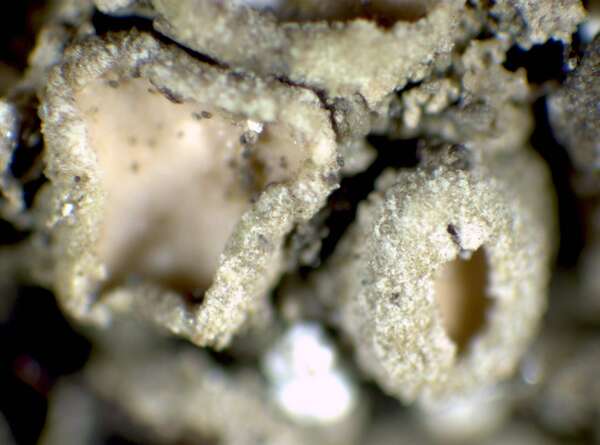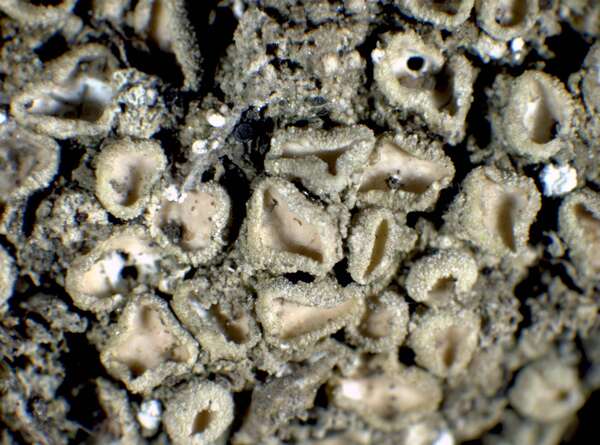Gyalecta peziza (Mont.) Anzi
Cat. Lich. Sondr.: 62, 1860. Basionym: Biatora peziza Mont. in Garovaglio - Saggio Not. Nat. Civ. Lomb., 1: 334, 1844.
Synonyms: Secoliga peziza (Mont.) Arnold
Distribution: N - TAA, Lomb, Piem (Isocrono & al. 2004).
Description: Thallus crustose, whitish or yellowish white, thin, often finely granular. Apothecia without a thalline margin (but often covered at the base by a thin thalline layer when young), sessile, strongly constricted at base, (0.7-)1-2.5 mm across, with a strongly concave, reddish-orange to orange-brown disc, and a thick, often inrolled and radially sulcate, paler proper margin. Proper exciple of radiating hyphae, brownish yellow in outer part, colourless within; epithecium colourless to pale reddish brown, often with yellow-brown granules; hymenium colourless, 60-90 µm high, the hymenial gel I+ blue sometimes turning reddish; paraphyses simple to sparingly branched in upper part, 1.5-2 µm thick, the apical cells 2-4 µm wide; hypothecium colourless to pale yellow. Asci 8-spored, cylindrical to elongate-subclavate, thin-walled, the apex without a conical point, the wall K/I+ blue. Ascospores 3-septate, with parallel septa, hyaline, narrowly ellipsoid, 15-21 X 4-5 µm. Photobiont trentepohlioid. Spot tests: K-, C-, KC-, P-, UV-. Chemistry: without lichen substances.Note: a mainly arctic-alpine, circumpolar species found on slightly calciferous soil rich in humus, and on terricolous bryophytes near or above treeline; probably restricted to the Alps in Italy, where it is generally rare.
Growth form: Crustose
Substrata: soil, terricolous mosses, and plant debris
Photobiont: Trentepohlia
Reproductive strategy: mainly sexual
Commonnes-rarity: (info)
Alpine belt: very rare
Subalpine belt: very rare
Oromediterranean belt: absent
Montane belt: absent
Submediterranean belt: absent
Padanian area: absent
Humid submediterranean belt: absent
Humid mediterranean belt: absent
Dry mediterranean belt: absent

Predictive model
Herbarium samples
Growth form: Crustose
Substrata: soil, terricolous mosses, and plant debris
Photobiont: Trentepohlia
Reproductive strategy: mainly sexual
Commonnes-rarity: (info)
Alpine belt: very rare
Subalpine belt: very rare
Oromediterranean belt: absent
Montane belt: absent
Submediterranean belt: absent
Padanian area: absent
Humid submediterranean belt: absent
Humid mediterranean belt: absent
Dry mediterranean belt: absent

Predictive model
| Herbarium samples |
 INDEX FUNGORUM
INDEX FUNGORUM
 GBIF
GBIF
 DOLICHENS
DOLICHENS





